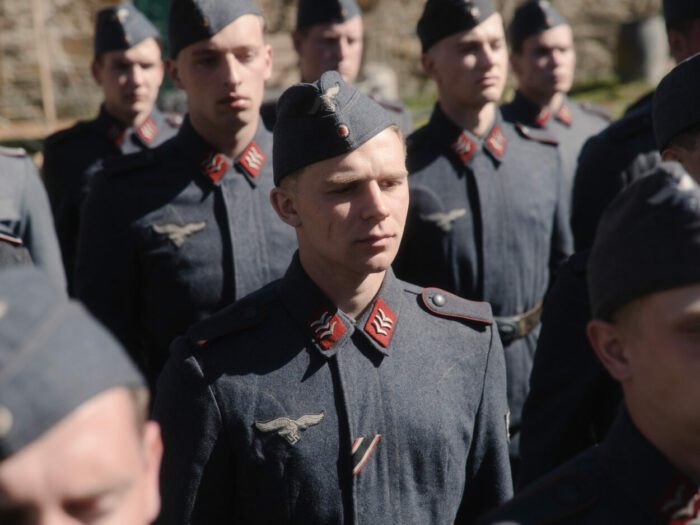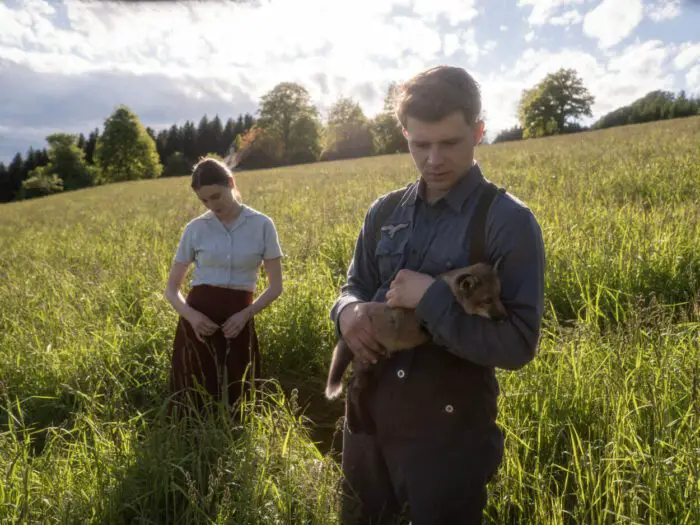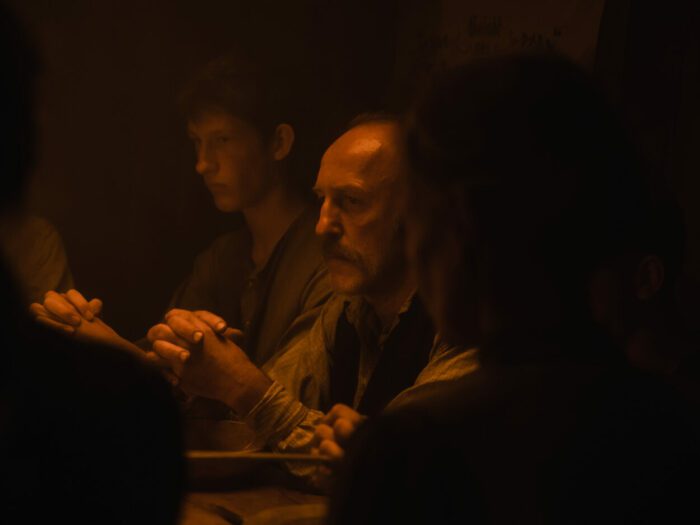If the Internet Movie Database makes for an accurate estimate, over 8,000 films and television shows list World War II as their keyword. And yet filmmakers continue every year (including recent Oscar winners Oppenheimer and The Zone of Interest) to find in that most pivotal moment in human history new stories to tell, mining the margins of its battles, its soldiers, its victims for tales that bring fresh perspective to an event thought already fully documented. Austrian filmmaker Adrian Goiginger’s great grandfather, Franz Streitberger, who was recruited to the Wehrmacht to serve the Nazi regime, kept his own WWII story a secret for generations before finally opening up to his great-grandson about his memories of the war that became the feature film The Fox (Der Fuchs).
Though it took Franz decades to divulge his experiences in the war, when he did, young Adrian—who was just fourteen at the time—knew the experience would make a compelling film, especially the story of “The Fox” that becomes this new feature film’s titular focus. The result is one of the best depictions of human-animal interactions commemorated to film, one that engenders emotion without sentimentality, a connection without Disney-fied anthropomorphism, in young Franz’s connection with an orphaned fox kit.
Little Franz, first played as a young boy by Maximilian Reinwald, grew up in the Pinzgau region of Salzburg, where he struggled with the high altitude and his family’s poverty. Undersized and undernourished, he needs his older, stronger brother to sneak him an extra half-potato at mealtime, and even then the poor boy would faint under the duress of his chores. His father Josef (Karl Markovics), a cold and calculating man, unable to feed and care properly for the boy, sells him to a farmer in the lower region. The film’s opening act, shot in a narrow Academy ratio and set in the Kitzbühel Alps, just a few kilometers away from the real-life century-old Streitberger farm, is stunningly captured and convincingly performed, its sequences and style reminiscent of the recent, magnificent The Eight Mountains.
Franz’s adolescence is elided as the narrative skips to his coming of age and the end of his indenture. Homeless and uneducated, Franz (now played by the adult Simon Morzé) is swayed by a Wehrmacht recruiter’s promise of three meals and a warm bed. So are many other young Austrians, who believe (this is 1938) that with the fulfillment of a three-year commitment they will earn a cozy administrative job for life. It’s a cruel irony lost on the young men—boys, really, just barely of age, and wholly ignorant of the atrocities their enlistment might entail.

Even among an uneducated and untraveled group, Franz sticks out as especially naïve, knowing nothing of politics, food, drink, or the girls in his region. He’s unable to connect with any of his regiment other than the affable Dillinger (Marko Kerezovic); worse, his letters to his father go unanswered. Feeling alone and unloved, Franz one day finds an unlikely companion in a fox kit whose mother is caught in a trap: he takes the kit under his own wing and cares for it, hiding it from his troop and command in his barracks. And with it, he develops an uncommon connection. Unable to love his family, disconsolate in his new position, and except for Dillinger entirely friendless, Franz finds in the fox a purpose. His careful, loving nurture keeps the fox alive, and well.
In Hitler’s regime, though, there is no time and no place for the illicit nurture of a pet fox kit. Duty calls—the Austrian troops are central to the occupation of France—and Franz risks his position to continue to care for the fox, even in a brief moment of panic abandoning his command. It’s a sign of his commitment to his pet that when he befriends a beautiful young French girl (Adrianna Gradziel) whose home is about to be occupied by German officers (and her their likely prisoner) that Franz can think of a future only with the kit, not with Marie, who clearly, to us at least, harbors some affection for him.

The Fox is a film whose narrative resides primarily in the gaps and crevices of the stories of World War II told onscreen to date. It’s by no means a conventional combat film with recognizable tropes, though Franz does participate in some of the war’s key battles and there are moments of intense action and peril. The Fox is less interested in the arc of the War that led to the Nazi occupation of France and later surrender than it is in its protagonist’s unique experience as a completely naïve young soldier coming of age in its midst.
Though he looks physically little like the actor who plays his character as a child, Morzé is wholly convincing as the recruit adrift while history unfolds around him. Though onscreen for only a part of the film, Gradziel is a compelling love interest who can’t quite capture her soldier’s full attention. And in the film’s first act, young Reinwald and the older Markovics as his father make for a gripping pair with at least two unforgettable scenes: one when the father tells the child a bedtime story of cheating Death (with a capital D) and the other when the boy is brokered away in anguish. That those two scenes in particular are so devastating makes The Fox‘s denouement, when Franz finally returns to his boyhood home, all the more affecting.

Also deserving attention is “The Fox” itself. Or, one should say, the foxes and their handlers. Wisely, Goiginger and his team never resort to crass sentimentalization of anthropomorphizing the fox kit. Trainers Fränze Lüttich and Herbert Pecher wrangle the three fox kits and two adults that play the single onscreen role into a coherent, realistic character without digital effects: the fox is simply the object of Franz’s devoted attention, its behaviors entirely naturalistic for a natural predator being for a time domesticated like a household cat or dog.
Although the film’s title privileges the fox, what sets this story apart from others is not the relationship between the animal and its caretaker, as affecting and unusual as it may be. What The Fox most effectively communicates by its conclusion is the love and attention a boy, even as a man, needs from his father. The Fox may be, like thousands of others, a WWII film and it may be also, less commonly, a convincing tale of human-animal companionship, but its real beating heart will eventually be found in the letters a young Franz writes to his absent father. Those, like the tale an aging real-life Franz eventually told his filmmaker-to-be great-grandson, are what makes The Fox a unique and compelling story well worth telling, even today.
The Fox, directed and written by Adrian Goiginger, debuts on Apple TV+ and Prime Video Friday, March 22, 2024.



